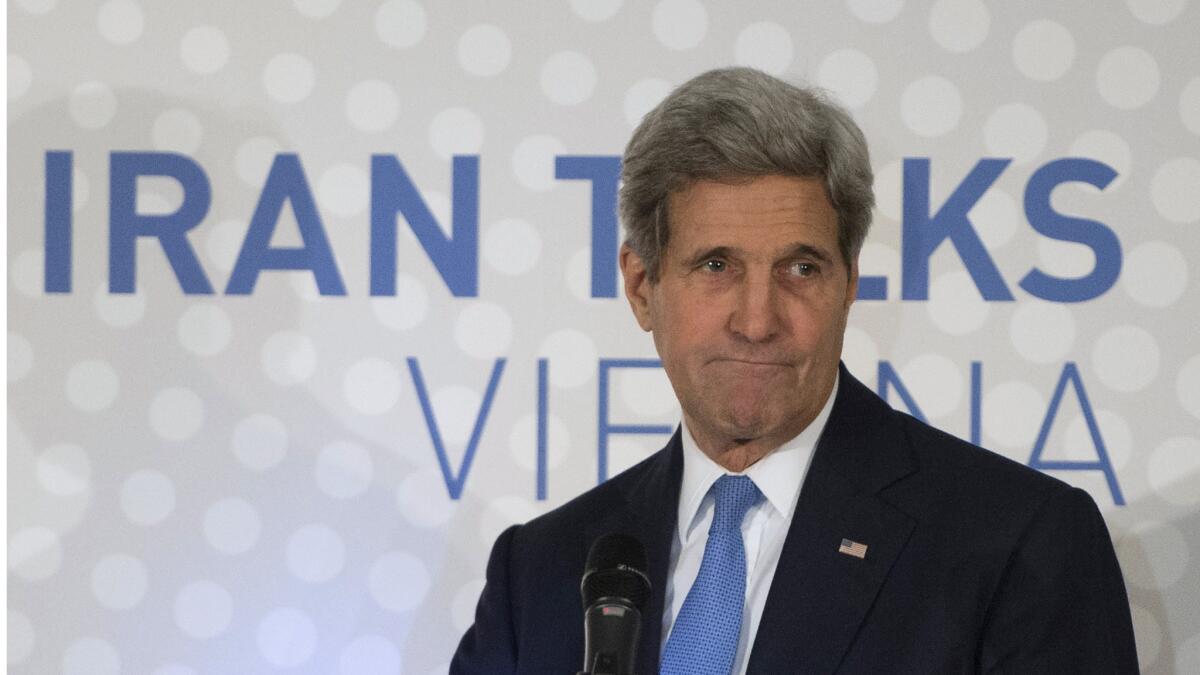The interim nuclear agreement with Iran may be as good as it gets

- Share via
Some of the world’s leading diplomats including Secretary of State John F. Kerry worked right up until their self-imposed deadline of Nov. 24 trying to reach agreement with Iran on limits to that country’s nuclear program.
But when the latest round of talks was over, they couldn’t point to much in the way of progress. That is, unless you count Iran’s willingness to continue observing an interim agreement that has traded modest reductions in Tehran’s nuclear stockpile for equally modest reductions in Western economic sanctions.
From the beginning, it had been doubtful whether Iran’s fiercely anti-American leader, Ayatollah Ali Khamenei, had any intention of getting to yes. The closest he came to endorsing the talks was last month, when he said he “wasn’t opposed” to them.
And then there was the problem of aligning the two nations’ agendas.
“The two sides are talking past each other,” John Limbert, a former U.S. diplomat in Iran, told me last week. “The United States is talking about centrifuges; Iran is talking about dignity and respect. It’s like a bad marriage.”
Negotiations are scheduled to resume this month, but diplomats are already beginning to talk about what to do if they break down. And both sides appear preoccupied with making sure that, if there is a breakdown, the other side gets blamed.
Some members of Congress, led by Sen. Robert Menendez (D-N.J.), chairman of the Senate Foreign Relations Committee, are talking about authorizing increased sanctions even before a breakdown happens.
And in Iran, demonstrators have protested U.S. offers of “colonial-era deals.”
Given the difficulties, it’s time to consider what would happen if we simply went on as we are now, renewing the interim agreement and leaving its modest bargain in place.
That wouldn’t end the nuclear standoff, but it could prevent it from getting worse and spiraling into war.
Under the interim agreement, negotiated a year ago, Iran has limited its uranium enrichment to a level well below what it would need to make a nuclear bomb, has suspended work on a plutonium reactor and has allowed increased international inspections of its nuclear facilities. In exchange, the United States and its allies have relaxed economic sanctions, giving Iran access to about $7 billion per year of its frozen oil earnings.
“I wouldn’t lose much sleep” if the interim agreement were renewed, said George Perkovich of the Carnegie Endowment. “The alternatives are either harder or worse.”
Hawks like Menendez will still want to increase sanctions, but there’s a big obstacle to that strategy: Sanctions work only if all of Iran’s major trading partners participate. And that’s not likely to happen unless Iran is clearly at fault for a breakdown.
But they would almost certainly buy in to maintaining the status quo. “The Russians and Chinese prefer to keep the [interim agreement] in place, even if the talks are stalled,” said Gary Samore, a former Obama administration official now at Harvard. Renewing the agreement comes with one more big advantage: Falling oil prices will put more pressure on Iran even without new action from Congress.
Thanks mostly to the sanctions, Iran’s oil revenue has plummeted from about $95 billion in 2011 to an estimated $50 billion this year. And now, if the price of oil stabilizes at its current level, Iran’s revenue could fall another $19 billion a year — a loss that dwarfs the $7 billion it’s reaping from sanctions relief.
Renewing the interim deal isn’t a long-term solution to the nuclear standoff for either side. It won’t give the United States and its allies all the safeguards they want, especially increased inspections of Iran’s facilities. And it won’t give Iran all the relief from economic sanctions it seeks.
And the deal could still fall apart. That might happen if the Iranian government restarted a secret nuclear development program, or if hawks in Congress passed tougher sanctions.
But there is one compelling reason to try to extend the agreement. “We’re in the business of trying to buy time,” Samore told the Foreign Relations Committee last week. “We’re in the business of trying to delay the program…. We shouldn’t kid ourselves that there’s a permanent solution to this problem as long as the current government in Iran is in power. Whatever we do is going to be a temporary measure.”
This is a case where half a deal is better than none.
Twitter: @DoyleMcManus
More to Read
Sign up for Essential California
The most important California stories and recommendations in your inbox every morning.
You may occasionally receive promotional content from the Los Angeles Times.














